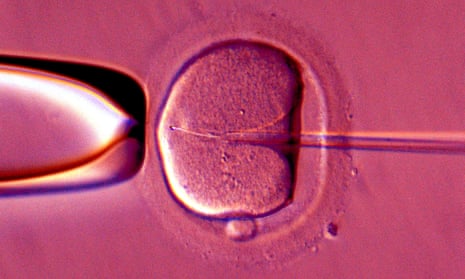‘The problem is,” says Prof Tim Child, medical director of Oxford Fertility, “all these Hollywood magazines with these women in their 40s who are having twins. It’s completely unrealistic.” Women of 45 or 46 regularly come into his clinic thinking they can have IVF with their own eggs, unaware of how unlikely that is to work. Dr Richard Paulson, of the American Society for Reproductive Medicine, calls the celebrity cult of silence around their fertility a “form of misinformation”. His organisation studied 240 star interviews in which pregnancy or children came up; only two had mentioned fertility treatment, despite the fact that more than half were over 35.
There may be reasons peculiar to Hollywood why a woman wouldn’t want to go public on the state of her ovaries – it is probably considered ageing to talk about IVF in an industry where the march of time is a matter of constant dispute. Or perhaps when your personal life is a matter of feverish general interest, to let the world glare right into your organs would feel a bit, I don’t know, intrusive. But it is possible, too, that the mothers of Hollywood are much like regular mothers and prefer not to talk about things that are nobody else’s business.
It is a cultural curiosity that everybody turns into Penfold when a woman over 40 has a baby, particularly twins. IVF is taken as read, unless (whisper it), it is one of those womb’s-last-hurrah moments, spontaneously shooting out two eggs to maximise its chances. Post-45, was it an egg donor? A fake pregnancy to mask a surrogate? The fascination combines two things: first, the suspicion of the older woman – much like a facelift, IVF is considered mendacious, a way of usurping the younger woman who ought naturally to have replaced you; second, an obsession with genetic authenticity, a timeless but obscure social demand that a child be the proper, DNA-stamped descendant of the parents who claim it. It is no wonder that people don’t want to subject themselves to this scrutiny because it has quite a hostile subtext.
Inevitably, however, if women in the public eye have very late, putatively “natural” pregnancies, this fuels unrealistic expectations that doctors are then in the unenviable position of having to dispel. Yet the really powerful disseminators of misinformation are not 240 actors, or even 2,400 of them, but the fertility industry itself. It is a market like any other: fantastically lucrative, flogging dreams, silent about failure. The US writer Miriam Zoll described the trope, saying: “It’s always this superhero patient who wins the jackpot. But if we look at the data from Europe, 77% of treatments fail. The US Center for Disease Control has the failure rate at 70%.” The industry seethes with pain and bereavement, which the business model relies upon never mentioning. We could blow the lid on the fantasy by following Ms A Celebrity to her gynaecologist appointments, but it would be more useful to follow the money.

Comments (…)
Sign in or create your Guardian account to join the discussion